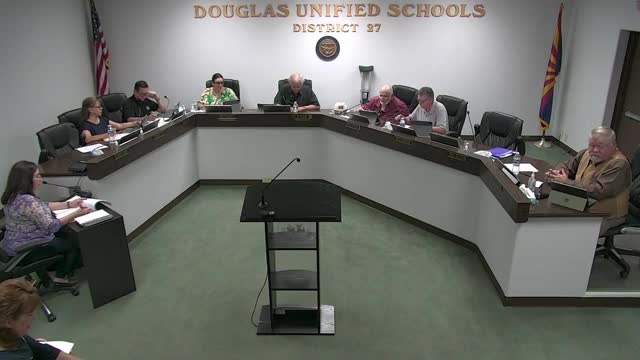Schools Embrace AI to Combat Cheating and Enhance Learning
July 03, 2024 | Douglas Unified District (4174) Collection, School Districts, Arizona

This article was created by AI summarizing key points discussed. AI makes mistakes, so for full details and context, please refer to the video of the full meeting. Please report any errors so we can fix them. Report an error »

In a recent school board meeting, discussions centered around the integration of generative artificial intelligence (AI) in educational settings, highlighting both its potential benefits and challenges. Board members reviewed a proposal aimed at incorporating language that would allow school districts to consider the impact of AI tools in classrooms.
The conversation revealed that AI is already being utilized within the district, with existing applications capable of scanning student assignments to detect potential cheating or non-original work. This technology has sparked enthusiasm among educators, particularly following insights gained from a recent leading change conference attended by district staff. Many principals shared their excitement about AI's ability to assist teachers in developing standards-based lessons.
However, the board acknowledged the complexities that arise with AI's use in education. Concerns were raised about how to accurately assess student work when AI can produce high-level essays in mere seconds. Board members discussed the gray areas teachers face when determining the authenticity of student submissions, especially as students may claim ownership of AI-generated work.
To address these challenges, the board emphasized the need for professional development for teachers, equipping them with tools to navigate the evolving landscape of AI in education. They noted that while AI can enhance learning, it also necessitates a responsibility among educators to understand and implement policies regarding its use.
The meeting concluded with a motion to approve the proposal, reflecting a commitment to adapt to the changing educational environment while ensuring academic integrity. As AI continues to permeate various sectors, the board's proactive approach aims to balance innovation with the essential principles of education.
The conversation revealed that AI is already being utilized within the district, with existing applications capable of scanning student assignments to detect potential cheating or non-original work. This technology has sparked enthusiasm among educators, particularly following insights gained from a recent leading change conference attended by district staff. Many principals shared their excitement about AI's ability to assist teachers in developing standards-based lessons.
However, the board acknowledged the complexities that arise with AI's use in education. Concerns were raised about how to accurately assess student work when AI can produce high-level essays in mere seconds. Board members discussed the gray areas teachers face when determining the authenticity of student submissions, especially as students may claim ownership of AI-generated work.
To address these challenges, the board emphasized the need for professional development for teachers, equipping them with tools to navigate the evolving landscape of AI in education. They noted that while AI can enhance learning, it also necessitates a responsibility among educators to understand and implement policies regarding its use.
The meeting concluded with a motion to approve the proposal, reflecting a commitment to adapt to the changing educational environment while ensuring academic integrity. As AI continues to permeate various sectors, the board's proactive approach aims to balance innovation with the essential principles of education.
View full meeting
This article is based on a recent meeting—watch the full video and explore the complete transcript for deeper insights into the discussion.
View full meeting
